SAINT JOAN OF ARC
Chinon to Reims
JOAN’S mission was to have the Dauphin Charles consecrated in Reims. The sign that was to authenticate her mission was to be the deliverance of Orleans. She gave Charles this proof right away, « in the form of a prophetic revelation, writes Fr. de Nantes, a dazzling light come down from Heaven to him who had doubts about everything, about his royal legitimacy, and even about being the legitimate child of the poor dead king Charles VI : “ I tell you in the name of My Lord – the King of Heaven – that you are the true heir of France and the son of the king ! He has sent me to you that I might I escort you to Reims, if you are willing ! ”
THE « THREE REQUESTS » MADE BY CHARLES
« Now, here is this revelation which was to convince the Dauphin, and us as well centuries later. It answered his own private doubts concerning his legitimacy, his descent and his rights, but also our own doubts about the consecration at Reims, the royal religion and the divine vocation of France over the centuries :
« “ Sire, do you not recall that on All Saints’ Day last, while you were in the chapel of your Castle of Loches, all alone in your oratory, you made three requests to God ? ”
« The king answered that he indeed recalled having made certain requests. And then the Maid asked him whether he had ever revealed those requests to his confessor or to anyone else. The king said no.
« “ And if I tell you the three requests that you made, will you believe in my words ” ? The king replied yes. Then the Maid said to him :
« “ Sire, the first request you made to God was to pray that if you were not the true heir of the kingdom of France, that it should be His pleasure to make you lose your determination to pursue it, in order that you might no longer be responsible for causing and prolonging the war from which proceeds so much suffering.
« Secondly, you prayed that, if the great adversities and tribulations suffered for so long by the poor people of France proceeded from your sin and were occasioned by you, that it might be His good pleasure to relieve the people of such sufferings and that you alone might be punished for them, bearing the penance either of death or of any other suffering He saw fit to send you.
« The third was that if the people’s sin was the cause of said adversities, that it might be His pleasure to forgive said people, to allay His wrath and free the kingdom from the tribulations which it had already suffered for twelve years and more. ” The king acknowledged that she had spoken the truth and trusted her words. »
« After the seventeen years of Joan’s “ hidden life ” at Domremy, the last four of which had been filled with apparitions and unceasing calls from Heaven for the deliverance of France, there now began the lightning epic of her three years of “ public life ”. » (French CRC n° 198, p.25-27)
THE MARCH ON ORLEANS
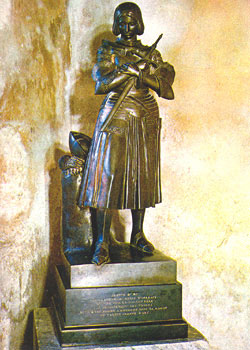
Towards the middle of April 1429 a royal army was assembled at Blois. On 27, it set off in the direction of Orleans. Gathered around the banner on which was painted an image of Jesus on the Cross, Priests and monks led the march of the royal army to the chant of Veni Creator. Joan wished to march directly on Orleans by the right bank of the Loire, where the city is situated. There were no obstacles on the way except the English fortresses; and Joan promised that the English would not budge.
« But the King’s captains did nothing but scoff and mock, saying : “ A right valiant champion and captain she is to recover the kingdom of France ! ” And they all murmured against the King and his counsellors, apart from the Duke of Alençon and a courageous captain of good will called La Hire, who sprang to his feet and swore that he would follow her with all his company wherever she would lead them. »
Unbeknown to the Maid, the captains took the road past Sologne on the left bank, to the south of the river. The road was long and difficult. After the first day’s march, it was necessary to set up camp for the night. The next day, they set off again, and the army marched in sight of Beaugency and Meung, occupied by the English who did not budge.
When they reached the south side of the river, Joan realised that she had been deceived. To enter the city, it was necessary to load the soldiers and the convoy of supplies onto barges. In any case, « the river was then so low that the boats could not navigate upstream or approach the bank ». Suddenly, a frail skiff appeared on the river. It drew alongside. A soldier jumped out. Others followed him. And then finally the person who was in command.
Joan advanced straight towards the group of captains and interrupted the conversation :
« In God’s Name, the advice of My Lord God is surer and wiser than yours. You thought to deceive me, and you have deceived yourselves, for I bring you the best aid that will ever have been given to a solider or a city : the aid of the King of Heaven. (...) Wait a little while, added Joan, for, in God’s Name, all will enter the city. »
Scarcely had she pronounced these words when a double miracle occurred, witnessed by everyone : « Suddenly, almost instantaneously, the Bastard of Orleans would relate, the wind which had been in the opposite direction, preventing the boats sailing upstream, veered and became favourable, immediately filling out the sails. » And « almost at once the water level rose, allowing the boats to reach the spot where the royal troops were stationed. » « From that moment, confesses the Bastard of Orleans, I felt a great confidence in her, more so than before. »
All that was needed was to obey Joan. But the captains would hear none of it. They decided that only the rations would be embarked on the barges in order to supply Orleans, while the army, for its part, would return to Blois to cross the river and then return by the north bank ! Joan did not wish to follow them. And it was agreed that Joan would enter in the city with the company of brave soldiers that the Dauphin had given her and of which she was in command. La Hire also decided to remain behind with his men.
Joan’s entry into the city of Orleans took place after dark : « she entered the city in full armour, mounted on a white horse, with her standard carried before her. The Bastard of Orleans was on her left. » Joan first asked to go to the Holy Cross Cathedral « to pay her respects to God her Creator » and to her King Jesus.
AN HEROIC WEEK
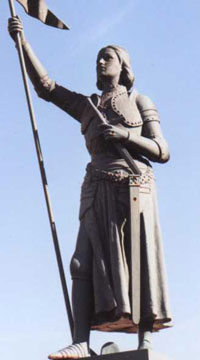 On the morning of April 30, Joan was ready for action. According to her, it was necessary to attack immediately. But the captains of the city balked, thinking it wiser to wait for the main body of the army. Joan submitted, but she was sad, because they took insufficient account of God’s help and power.
On the morning of April 30, Joan was ready for action. According to her, it was necessary to attack immediately. But the captains of the city balked, thinking it wiser to wait for the main body of the army. Joan submitted, but she was sad, because they took insufficient account of God’s help and power.
To please the brave citizens of Orleans, who could not « see enough of her », she agreed to pass through the streets of the city again. The faithful city treated her like a queen.
Between April 30 and May 2, Joan three times sent a demand to the English. The only reply she received was from Glasdale who vulgarly insulted her, calling her a cowgirl and a trollop.
The 4 May, the army entered Orleans without the English being able to stand in the way, just as Joan had promised. But, in the afternoon, without informing the Maid, Dunois, the Bastard of Orleans, chose to wage battle against the Saint-Loup fortress. The French suffered heavy losses. Joan who was resting in her lodgings, woke with a start and she hurriedly put on her cuirass and rushed to the Burgundy gate.
The French were already retreating in disorder, when they suddenly saw the Maid and her standard. Then, raising an immense cheer, they returned to the battle. Before the end of the day the Saint-Loup fortress was taken.
Seeing so many dead soldiers on the battlefield, the Maid wept and, kneeling down, humbly made her confession. « Before five days, she added, the siege will be raised, and there will not remain a single Englishman around Orleans. » That was on May 4. The 8, victory would be achieved !
The following day, Friday 6, Joan wished to pass over to the left bank. It was an audacious piece of folly. The first assault against the Fort of the Augustins was repelled, and the captains had the troops re-embark without informing Joan. The treason had already begun ! Joan, realising what had happened, rallied her men and returned to the assault. By the end of the afternoon, a column of flames and smoke announced the second disaster suffered by the English.
Then, turning toward her chaplain, she told him :
« Tomorrow, get up early in the morning. You will have more to do than you had today. Do your best. Remain always within sight of me. Tomorrow I will undergo a terrifying ordeal, an ordeal such as I have never suffered before. Tomorrow I will be wounded. Blood will flow above my breast. »
THE DOVE OF VICTORY
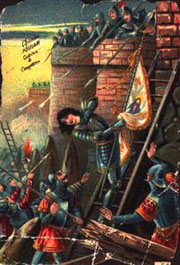 On the morning of May 7, the entire population ran over to the ramparts. But there is no redemption without shedding of blood. Early in the afternoon, the Maid, ever ardent, always in the front line, had gone down to the moat and was preparing to raise a ladder when a crossbow bolt struck her through a chink in her cuirass, above her breast. Joan pulled it out with her own hand – imagine the pain ! – and was quickly taken to the rear.
On the morning of May 7, the entire population ran over to the ramparts. But there is no redemption without shedding of blood. Early in the afternoon, the Maid, ever ardent, always in the front line, had gone down to the moat and was preparing to raise a ladder when a crossbow bolt struck her through a chink in her cuirass, above her breast. Joan pulled it out with her own hand – imagine the pain ! – and was quickly taken to the rear.
Having received some basic treatment, she was soon wishing to return to the battle. « Return to the attack in God's name. Without any failing on their part, the English will no longer have the strength to defend themselves... »
Won over by such great assurance, the army again bestirred itself and, surprise ! All of a sudden, Joan saw her sacred standard flying ahead of them in the distance, under the boulevard wall of the Tourelles. When Joan saw it, she called out to the soldiers in the tones of one inspired : « Take note, when the staff of my standard touches the boulevard, all will be yours. » The French then charged into the moat, raising a terrifying clamour.
While Joan was brandishing her standard, « certain knights saw a white dove flying overhead ». It is under the sign of the dove that Our Lord God wishes to grant victory to the French when He takes pity on them. Therein lies a mystery whose revelation and realisation will be completed by the consecration at Reims.
In the night, the English abandoned their fortresses, raising the siege of Orleans.
THE LOIRE CAMPAIGN
Joan was now dearly loved by the entire people and inspired a religious terror among the English. She was still a subject of controversy among the royal counsellors, but was supported and inspired by her Voices. And now came the magnificent campaign of the Loire : Beaugency, Meung, Jargeau, and finally Patay, on June 18, « the greatest victory that the noble king had ever had ». It was indeed the hour of God’s miracle, all the more striking in that it exceeded every expectation.
The captains asked for Joan’s orders : The Maid ordered an attack on the enemy, « with good spurs ! » she specified, for they will flee and will not stop. The English lost two thousand soldiers on the battlefield, while there was but one killed in the French camp. The victory of Patay, along with the deliverance of Orleans, is the greatest miracle in our military history.
Popular enthusiasm was at its height. Large numbers were of men were enrolling in the army. But the “ politicians ” counselled prudence : to go to Reims, what madness ! It would only provoke the Duke of Burgundy and throw him into the arms of the English. As for Joan she urged the Dauphin Charles to listen to her.
THE ROAD TO THE CONSECRATION
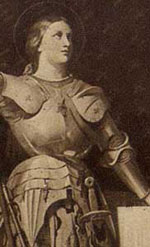 The King ordered the others to follow her. Reims was already in all their hearts. The march towards the consecration had begun, a holy procession of lilies reblossoming, of royalty resurrected.
The King ordered the others to follow her. Reims was already in all their hearts. The march towards the consecration had begun, a holy procession of lilies reblossoming, of royalty resurrected.
But Troyes resisted, and Regnault de Chartres once again took advantage of this to attempt to persuade the King to temporise and to come to an understanding with Burgundy. Joan said :
– Noble Dauphin, order your people to lay a genuine siege to Troyes. Do not prolong these debates. In God’s Name ! I will have you enter this city which is yours BEFORE THREE DAYS, either by force or by love. The whole of Burgundy will be astonished. »
Thereupon, leaving the Council, she mounted her horse and called on everyone to set to work. Won over, subjugated, they fetched bundles of wood and everything that could serve to fill the ditches. She had cannons and siege engines brought up, and arranged them in a battery as the most seasoned of captains would have done. They worked all night long. At dawn, everything was ready.
At this sight, the bourgeois of Troyes understood that things were serious. An assault was imminent. They rushed to the city gates and opened them to their legitimate sovereign. Joan had been proved right against all and everyone. It was July 10.
On July 16, 1429, the royal army arrived at Reims, the city of the Consecration, the goal of Joan’s mission. The campaign judged to be impossible had lasted nineteen days !
THE PACT OF REIMS, FOUNDATION OF THE ROYAL RELIGION
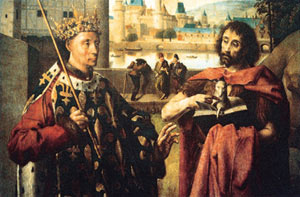
There can be no better illustration of the fact, well known throughout Christendom, that the covenant between Christ and France, sealed at the time of the baptism of Clovis and renewed from generation to generation through the consecration of the kings of France, is enshrined within the new and eternal Covenant which Jesus sealed through His Sacrifice between Himself and His Church. (Jean Eyck, Louvre, Photo CRC).
On the morning of July 17, the consecration took place in all its splendour in the cathedral.
Joan visited the Abbey of Saint Remy. This abbey-church is the reliquary of France, on account of the remains of its saintly founding bishop which are venerated there, and even more so on account of the “ heavenly chrism ” which is kept there, brought, according to tradition, by a dove, during the baptism of Clovis.
Fr. de Nantes has frequently explained the meaning and significance of this « founding event », a divine act establishing for perpetuity the kind of government that the holy kingdom of France must have, a nation that is the particular kingdom of the King Jesus. It is in this baptism that the royal religion takes its origin, and outside of this religion there is no salvation for France :
« Astounding ! Unique in its kind, this covenant between Jesus Christ and a nation finds support in an event which sheds a brilliant light on it : we refer to the covenant sealed by God with Abraham and his descendants, with the Hebrew people led by Moses towards the Promised Land, with the tribe of Judah and in particular with David and his race forever. To the Dauphin of France, Joan repeats the oracle that the Prophet Nathan made to David, and she escorts him to Reims to receive the anointing of oil which is in all points like the one that the Prophet Samuel, acting on God’s instructions, conferred on David to make him king. “ The tribe of Judah was the anticipatory figure of the kingdom of France. ”
« The other covenant, which is similar and certainly more sublime and more perfect, is the very institution of the Church by Christ her Head and Spouse, conferring on Saint Peter and his successors the unction of the Holy Spirit to sanctify and govern her under His guidance, with His divine assistance until the end of the world. Such is the Church whose Sovereign Pontiff is subject to the King of Heaven, acting as His lieutenant and vicar on earth.
« In the same way, the king of France is said by Joan to have received from Christ the command of His kingdom. Hence the covenant between Christ and France is entirely enshrined within that New and Eternal Covenant which Jesus sealed with His sacrifice, between Himself and His Church. Thus the kingdom of France is comparable to the Church, and the king to the Roman pontiff, like the eldest daughter to her Mother, like a son of predilection to his Father.
« Prior to Joan, Christ’s particular relationship with the nation of the Franks through the medium or ministry of its king and his dynasty had already been affirmed a hundred times, and by approved authorities. It had produced fruits of political order and Christian holiness. Yet it had never been revealed so clearly from above nor proven by such noteworthy miracles that it could not be doubted. (...) Joan of Arc had received the mission to escort her king to Reims to be consecrated. And in this she authenticated our royal religion and its divine source. » (French CRC n° 198, p. 28-29)
« LONG LIVE THE KING ! »
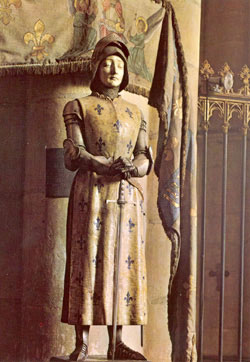
in the Cathedral of Reims.
The bells of all the churches in Reims were tolled and rang out joyfully, announcing the procession that was advancing in all its magnificence. Joan was by the King’s side, attracting everyone’s attention. In the choir, she took her place near the altar, on the Gospel side. Tapestries and candles lent the cathedral colour and warmth, rather like a bridal chamber.
When they saw her standard unfurled at the top of her spear, a quiver ran through the congregation – just like the time it had inspired the attackers to scale the enemy walls. It was a singular honour, as this standard was the only one to fly in this church. « It was there in the fray, it was only right that it should be there in the place of honour ! » the Maid would declare.
Near the altar, France’s herald-at-arms, proceeded to call the twelve peers of France. There was a poignant silence. Not a single one of the lay peers answered. As for the ecclesiastical peers, only two were present, one from Reims, Regnault of Chartres ! and the other from Châlons... Substitutes were immediately appointed. Then Charles, kneeling, with his hands on the Gospels, took the oath...
The moment had arrived for the anointing by oil taken from the Sacred Ampulla. It was applied to the King’s head, to his chest, on his back between the two shoulders, under his armpits, in the joints of his two elbows, and to the palms of his hands.
Then the archbishop placed the ring of the covenant on the King’s finger with these words : « Receive the signal ring of the holy Faith, a stable kingdom and an increase in power, by which things know how to expel your enemies with triumphal power, exterminate heresies, unite your subjects and attach them to perseverance in the Catholic faith of Jesus Christ. »
And « when the crown was placed on his head, everyone shouted : “ Noel ! ” and the trumpets sounded in such wise that it seemed that the vaults of the church should crack ! »
After the Mass, Joan was seen « kneeling before the king, embracing his legs, kissing his foot and weeping warm tears. »
Taken from Resurrection, n° 17, May 2002, p.13-19